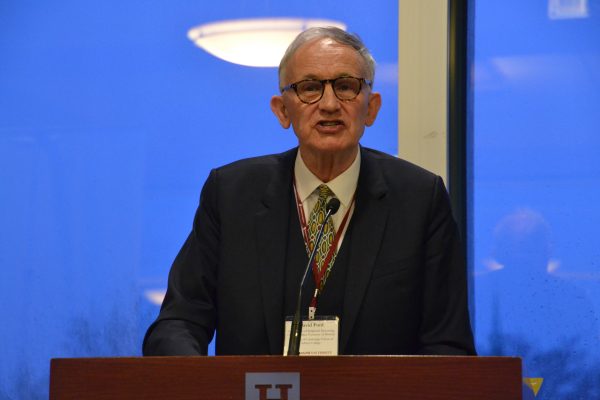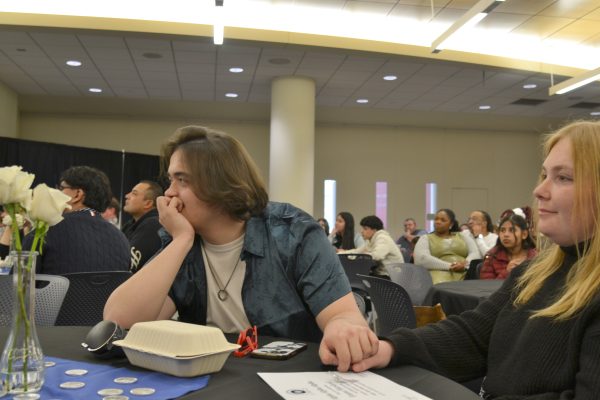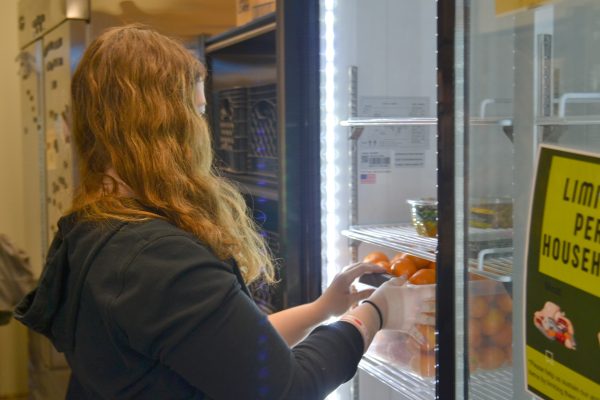Hamline FRC facing fast-approaching changes
The Food Resource Center’s future is unclear as time runs out on their government-based program and plans for what comes next are undecided.
October 15, 2021
Hamline’s Food Resource Center (FRC) has reached its final year on the AmeriCorps VISTA Program, facing external support’s time running out in July of 2022. There has been no official plan or announcement for who will fill the managerial duties of Sophia Brown, the VISTA staff member, resulting in the possible closure of the FRC without this position filled.
The AmeriCorps VISTA program provides three years of support and resources that allows the institution to make sustainable structures related to food security and access. Hamline has worked towards these changes knowing these three years would end, with COVID-19 being an unavoidable emergency in the past year and a half.
“When we put this forward, we had no idea that we would be in the place where we are today but we’re here,” Dean of Students Patti Kersten said. “I think COVID also brought even more to light the need for food resources for students and for the broader community as well but in this case for our students.”
As Hamline enters less than nine months to the end of this resource, plans have not been solidified about the future of the FRC.
Hamline’s Student Affairs, which ultimately oversees this resource, are currently under program review complicating and delaying any decisions from being finalized. These decisions would allow Brown and other staff and student workers to move forward with proposals and plans.
“We do have options, but we’re in a standstill because of the program review…” Brown said. “If I were to establish this sustainable pathway forward, it would be nice to be able to have a staff person come in next and only have to worry about management and not have to worry about expansion and sustainability.”
The goals of the FRC go beyond staying open. The factors that will influence the overall sustainability of this resource is an institutionalized staff and student work-study budget, a different space, and culturally and religiously appropriate as well as allergen and sensitivity food options.
Currently the FRC operates out of the Walker Fieldhouse Loading Dock where they do not have a sink or enough space and storage for how large it has grown.
“The resource, the service, the program is important to me. And I also would say it’s important to the university,” Kersten said. “There’s no intention to, to have the food resource center go away in any way, if anything it’s about really being able to, again, create it to be what’s needed in the years to come as compared to reducing or removing.”
The FRC has no requirements for individuals to meet in order to utilize the support.
“I just think it’s extremely important for students to know that that is an option for them to be able to fall back on it or access as much as they need to,” junior Anika Duckwall, executive board member of the FYB campaign student org and user of the FRC, said. It’s just very important whether students live on campus or they’re commuters to be able to have that food access and know that it’s not coming from any place of judgment.”
The FRC and FYB campaigns were and still are instrumental in Hamline’s fight against food insecurity. Hamline alum An Garagiola-Bernier, cofounder of FYB and advocate for food sovereignty, researches the impacts of food insufficiency and is reminded of the term “food apartheid” when considering this topic.
Garagiola-Bernier explained how access and control of food and food systems have been impacted by factors such as socioeconomic status, systemic racism, religion, location and, most recently, the COVID-19 pandemic.
“This term helps us look at the structural roots of food insufficiency among Black, Indigenous, and People of Color…” Garagiola-Bernier wrote. “Black, Brown, Indigenous, Queer, and Muslim students are disproportionately impacted through a variety of health and economic factors… This is not only a food justice issue, it is also a matter of diversity and retention.”
Students and alumni feel the situation is hard to swallow considering the importance of this resource in their eyes.
“What is worse than a college not having a food pantry, is a college opening a food pantry, seeing its benefits firsthand, and then deciding it is not important enough. This is a form of institutional betrayal and Hamline students will not forget that once again, Hamline did not put their money where their mouth is….” Emma Kiley, cofounder of Feed Your Brain (FYB) and Brown’s predecessor, wrote via email. “Students rely on the FRC not only for free, healthy food, but also as a space that acknowledges and affirms their experiences and destigmatizes asking for help, especially on a campus that is trying to uphold an image of prestige and wealth.”
This all comes after Hamline has been an example of the fight against food insecurity on an international scale.
“There have been awareness campaigns on student hunger, peer-reviewed journal articles written, multiple news outlets including Teen Vogue and The Henry Ford Magazine have covered the ground-breaking food justice work being done at Hamline, so it is extremely frustrating and disappointing to hear not only that HU admin still has not institutionalized the food resource center, but that the center is at risk of closing” Garagiola-Bernier wrote.
Alumni and current students recognize the events with the FRC point to a larger systemic issue.
“Hamline needs to reflect deeply on their commitment to student diversity, and come to an understanding about what it means when colleges target students from low-income families in admissions processes. Nonacademic resources like the FRC are critical to the success of [First Generation Low Income] students, a demographic that Hamline continues to exploit,” Garagiola-Bernier wrote.
The resource of the FRC addresses a need that exceeds the classroom, Kiley agrees is instrumental in student’s success.
“We all know that private universities are struggling financially but allowing the FRC to close would mean losing current and future students, resulting in even more of a financial loss. An investment in students’ basic needs is an investment in Hamline at-large,” Kiley said.
For information about the FRC and food security, check out: https://tinyurl.com/ywk559rs






